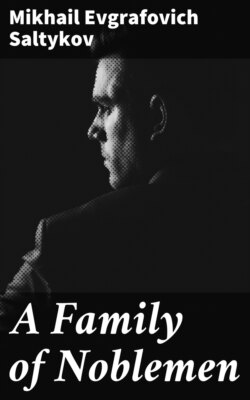Читать книгу A Family of Noblemen - Mikhail Evgrafovich Saltykov - Страница 4
На сайте Литреса книга снята с продажи.
CHAPTER I
ОглавлениеAnton Vasilyev, the manager of a remote estate, was giving his mistress, Arina Petrovna Golovliov, an account of his trip to Moscow. He had gone there to collect the money due from those of her peasant serfs who bought the right to live in the city by paying her a tax. When he had finished with his report, she told him he might retire, but he lingered on irresolutely, as though he had something else to say, yet could not make up his mind to say it.
Arina Petrovna knew her servants through and through; she knew the meaning of their slightest gestures, she could even divine their inmost thoughts. And her steward's manner immediately aroused her disquietude.
"What else?" she asked, looking at him keenly.
"That's all," he replied evasively.
"Don't lie. There is something else. I can see it by your eyes."
Anton Vasilyev still hesitated and continued to shift from one foot to the other.
"What is it? Tell me!" she shouted imperiously. "Out with it, out with it! And don't wag your whole body like a dog, Telltale!"
Arina Petrovna liked to call her managers and domestics by nicknames. She used Telltale for Anton Vasilyev, not because she had found him to carry gossip treacherously, but simply because he had a loose tongue.
The centre of the estate that he managed was an important trading village in which there were many taverns. He liked to take a glass of tea in a tavern and boast of his mistress's great power. And in the course of his boasting he would sometimes unconsciously blab out secrets. His mistress was always with a lawsuit on her hands, so that her trusty's garrulousness sometimes brought her sly stratagems to the surface before they could be executed.
"Yes, I have got something else to say," Anton finally mumbled.
"What is it?" Arina Petrovna asked excitedly.
An imperious woman, with an extraordinarily lively imagination, she instantly pictured all sorts of disagreeable opposition and antagonism, and the thought so instantly took complete possession of her that she turned white and jumped up from her chair.
"Stepan Vladimirych's house in Moscow has been sold," Anton said after a pause.
"Well?"
"It's been sold."
"Why? How? Tell me."
"For debts, I suppose. Of course it can't be because of something nice."
"The police, the court, sold it, I suppose?"
"I suppose so. They say it was sold at auction for 8,000 rubles."
Arina Petrovna dropped back heavily into her armchair and gazed fixedly at the window panes. She was so stunned by the news that she seemed to have lost consciousness for a while. Had she heard that Stepan Vladimirych had killed somebody, or that the Golovliov peasant serfs had risen in revolt and refused to render the service due her on her estates, or that serfdom had been abolished, she would not have been so shocked. Her lips trembled, her eyes stared vacantly into the distance, but she saw nothing. She did not even see the little girl, Duniashka, run past the window carrying something hidden under her apron; she did not see the child stop suddenly on beholding her mistress and wheel round and then dart back guiltily to where she had come from. Such suspicious conduct at any other time would have led to a thorough investigation. Finally Arina Petrovna came to herself and managed to bring out:
"A good joke, I must say." After which there again followed several minutes of ominous silence.
"So the police sold the house for eight thousand?" she asked again.
"Yes, madam."
"So that's what he's done with his patrimony! Splendid! The blackguard!"
Arina Petrovna felt that the news called for a prompt decision, but nothing occurred to her. Her thoughts ran confusedly in exactly opposite directions. On the one hand she thought: "The police sold it. But the police could not have sold it in a minute. An inventory must first have been taken, then an appraisal made, and then the sale must have been advertised. Sold for eight thousand when I myself two years ago paid twelve thousand rubles for it, not a penny less. Had I only known it was going to be up for sale, I could have bought it myself for eight thousand rubles."
Her other thoughts ran: "The police sold it for eight thousand. That's what he's done with his patrimony. To sell one's patrimony for eight thousand rubles!"
"Who told you?" she asked, realizing finally that the house had been sold and the chance to secure it cheaply was gone forever.
"Ivan Mikhailov, the inn-keeper."
"Why didn't he let me know in time?"
"I suppose he was afraid."
"Afraid? I'll teach him to be afraid. I'll make him come here from Moscow, and the moment he comes I'll have him drafted into the army. He was afraid!"
Although on the decline, serfdom still existed. Anton Vasilyev had known his mistress to impose the most peculiar punishments, but, even so, her present decision was so unexpected that it made him miserable. He thought of his nickname Telltale. Ivan Mikhailov was an upright peasant, and Anton never dreamed that misfortune would touch him. Besides, Ivan Mikhailov was his friend and godfather. Now, all of a sudden, he was to be made a soldier just because he, Anton Vasilyev, the Telltale, could not hold his tongue.
"Forgive him—Ivan Mikhailov, I mean," he pleaded.
"Go away, you mollycoddler," she shouted in a voice so loud that he lost all desire to intercede any further for his friend.
